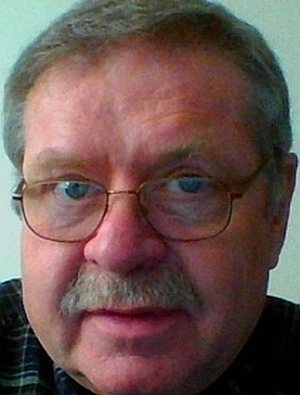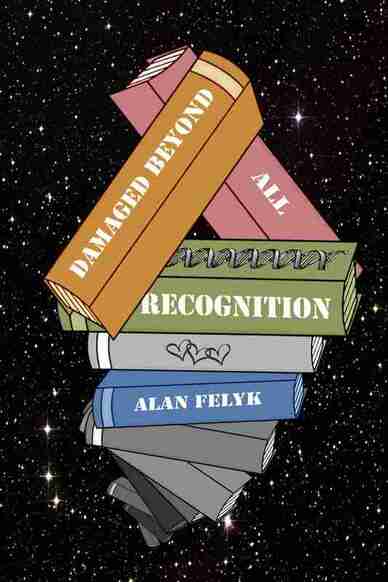 Alan Felyk is a critically acclaimed novelist who spent 40 years working as a newspaper journalist and space industry editor. A University of Colorado graduate, he published a humorous, sometimes wistful memoir, Damaged Right Out Of The Box, in 2012. Six years later he published Damaged Beyond All Recognition, a novel that blends science fiction, romance, and humor. It was nominated for Underground Book Reviews' Novel of the Year Award and won the Literary Titan Book Award. In addition, it received a five-star award from the Readers' Favorite Book Reviews and Awards Contest as well as plaudits from Kirkus Reviews, OnlineBookClub.org, and Bookpleasures.com. He is now working on a sequel to the novel—Damaged And No Longer Under Warranty. He lives in Lakewood, Colorado. I vividly remember watching the first television episode of the Twilight Zone on October 2, 1959. Starring Earl Holliman, it was titled “Where Is Everybody?” and written by Rod Serling. The episode was about a man wearing a U.S. Air Force uniform who inexplicably finds himself in a town occupied only by mannequins. The story ended with an unexpected twist, and I became hooked on the series. It wasn’t long before I started writing short stories that tried to mimic Serling’s imagination. The stories, written by a grade schooler and unworthy of publication, remained unread by others—they were deservedly thrown into the trash went I left home for college. During my senior year in high school, I became hooked on another television show, Rowan and Martin’s Laugh-In. So, when my English teacher, Miss Bronson, asked us to write something creative, I wrote a parody of the show, substituting the show’s characters with school teachers and administrators. I had cast Miss Bronson as the character that Goldie Hawn portrayed on the show—a ditsy, giggling blonde. My teacher loved what I had written—so much so that she read my script aloud to the class. Within short order, the classroom’s atmosphere turned uproarious. As I wrote in my memoir, it was a pivotal moment for me: “… I learned that, with some keystrokes on the typewriter, I could make someone laugh.” In my early twenties, I wrote a short story that drew the attention of the fiction editor at Omni, a science and science fiction magazine. He said he loved my work, but that I was competing for space with authors who were named Isaac Asimov, Ray Bradbury, and Arthur C. Clarke. Instead of focusing on the positive, I focused on the negative. My desire to write yielded to the stress of raising a family and working jobs that often required much more than forty hours per week. At the age of thirty-four, I accepted a job in the space industry, and I ran into a college girlfriend, Sam, who was working at the company as well. I had unceremoniously dumped Sam thirteen years earlier in favor of a previous girlfriend who returned to me. Although I didn’t regret what had happened, I always regretted how it happened. Still, I could bring myself to apologize to Sam, and we worked on several projects together before her untimely death in 2010. Guilty about my failure to make amends to Sam, I decided to make good on a promise I had made to her in college: that I would write a book. So, I decided to write a memoir, and the first section I wrote was my relationship with her. It sparked a piece of advice that I continue to provide to memoir writers: “If you ever consider writing an honest personal experiences book, start with the things that you're not proud of. Then write about the things that hurt the most. If you get past those two things, you'll finish the book—if it isn't already finished.” Despite the story about Sam, the memoir was largely humorous. And after I published the book, I was lost as to what I should write next. I thought about jotting down my satirical observations about an ever-changing world, but the project never gained traction. I still toyed with the idea of writing science fiction short stories, and I dusted off the story I had sent to Omni many years ago. At that time, I had started reading The Sirens of Titan, a comic science fiction novel by Kurt Vonnegut. Not only was his book brilliant, but it seemed to be written in the very style that I had developed over the years. Suddenly, it all made sense. Why not combine the two genres I loved so much? Unconvinced that I could write a full-length novel, I was determined to simply rewrite my short story by adding satire to it. But as I delved back into it, the original storyline began to expand. It was almost as if Vonnegut’s spirit was suggesting plot elements. And, before I realized what had occurred, I was in the middle of a book. Now, I’m writing a sequel to the novel, and I expect a third book in the Infinity’s Trinity Series. If there is a lesson from all this, it’s that aspiring (and perhaps struggling) writers should never call it quits. No one knows when an unexpected spark might ignite the next literary triumph. My biggest regret is that I didn’t find that catalyst decades ago. But my biggest joy is that it did, in fact, manifest itself. I have mulled the possibility of writing a humorous self-help book entitled How To Write A Novel In 50 Years Or More. It would cover the dozens upon dozens of reasons that prevent authors from sitting at a keyboard and sharing their imaginations with the world. Who knows? Perhaps another catalyst for that project will emerge. Hey, Kurt, are you still out there? Damaged Beyond All Recognition Paul Tomenko is no stranger to the improbable. He became a magazine sweepstakes winner and celebrated counterculture writer by age nineteen. Now, after reaching for a can of Chef Boy-ar-dee spaghetti and meatballs, he’s traveling to and from God’s library somewhere outside the Universe to prevent the end of eternity. Because of a DNA flaw, humanity no longer can ascend through the Planes of Existence after they die. That means no one will have the needed expertise to replace God when He dies. And, to complicate matters, Paul realizes he must enlist the help of his two lovers: Maggie Mae Monahan, a brilliant geneticist who has the uncanny ability to “connect the dots,” and Allie Briarsworth, a novelist who inexplicably senses past and future events in the cosmos. But the trio discovers the preservation of forevermore can turn someone’s soul inside out. Literally. Find Alan on Facebook and Twitter Where to Buy Damaged Beyond All Recognition
0 Comments
Leave a Reply. |
AuthorI'm generally pulled in a million different directions and I wouldn't trade it for the world. Here's a glimpse of my life - hope you enjoy it! And if there's a big lapse between posts, well, that's the way life goes in Amy's world. Archives
October 2022
Categories
All
|
|
Copyright 2024 by Amy Rivers. All rights reserved. |
 RSS Feed
RSS Feed